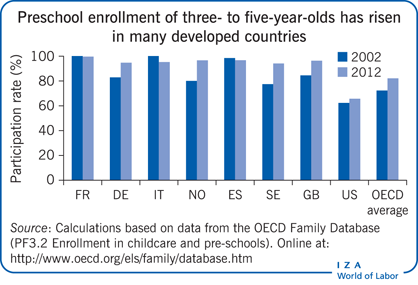Elevator pitch
Since the 1970s, many countries have established free or highly subsidized education for all preschool children in the hope of improving children’s learning and socio-economic life chances and encouraging mothers to join the labor force. Evaluations reveal that these policies can increase maternal employment in the short term and may continue to do so even after the child is no longer in preschool by enabling mothers to gain more job skills and increase their attachment to the labor force. However, their effectiveness depends on the policy design, the country context, and the characteristics of mothers of preschoolers.

Key findings
Pros
When low maternal employment is driven by a lack of affordable childcare, universal preschool can encourage more mothers to work.
Universal preschool may enable the accumulation of job skills and lead to greater attachment to the labor force in the long term.
Where universal preschool has increased maternal employment, effects have been found to persist for several years.
Increasing the quality, availability, and flexibility of universal preschool could move more mothers into employment.
Cons
If universal preschool simply crowds out existing informal or privately paid childcare, it will have little impact on maternal labor supply.
In countries with low female labor demand and more traditional views of gender roles, universal preschool may be less effective at increasing maternal employment.
A targeted approach may be more cost-effective if universal preschool increases labor supply mainly of low-income mothers and mothers with less non-labor income, such as single mothers.